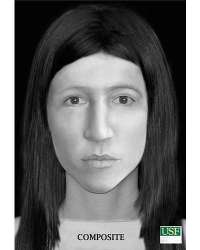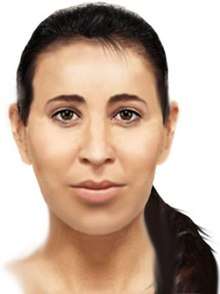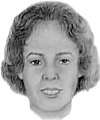Little Miss Lake Panasoffkee
Little Miss Lake Panasoffkee, or Little Miss Panasoffkee, is the name given to an unidentified young woman found murdered on February 19, 1971, in Lake Panasoffkee, Florida, United States.[4][5] She has remained unidentified for almost 50 years.
Little Miss Lake Panasoffkee | |
|---|---|
 Forensic facial reconstruction of "Little Miss Lake Panasoffkee", created in 2012 | |
| Born | Approx. 1946–1954 |
| Status | Unidentified for 49 years, 5 months and 29 days |
| Died | c. January 20, 1971 (aged 17–24) |
| Cause of death | Homicide by ligature strangulation |
| Body discovered | February 19, 1971 |
| Resting place | Oak Grove Cemetery Wildwood, Florida, U.S.[3] |
| Known for | Unidentified victim of homicide |
| Height | Between 5 ft 0 in (1.52 m) and 5 ft 5 in (1.65 m) [1][4] |
| Children | 2 or more |
The murder remains unsolved despite the forensic reconstruction of the victim's face in 1971 and 2012.[4][6] The case was featured on the television show Unsolved Mysteries in an episode that premiered on October 14, 1992.[1][2][7][8][9][10]
Discovery of the body
On February 19, 1971, two teenage hitchhikers discovered a partially submerged figure floating beneath a highway overpass in Lake Panasoffkee, Florida.[11] Authorities retrieved the fully clothed, badly decomposed body of a young woman from the lake. The body had no identification papers.[12]
The body was dressed in a green shirt, green plaid pants, and a green floral poncho. Also found were a white gold watch[4][13] and a gold necklace. On her ring finger there was a gold ring with a transparent stone, indicating that she may have been married.[14][15][16]
A forensic examination of the remains was conducted by Dr. William Schutze. Schutze concluded that the victim had been killed approximately 30 days before her body was discovered.[6][13] A man's size-36 belt was fastened around her neck, strongly indicating strangulation as the cause of death.[13][17]
Forensic examination
The body was exhumed in February 1986 for further forensic examination.[12][18]
The woman was determined to have been between 17 and 24 years old when she died, weighing about 115 pounds. She had brown hair and prominent cheekbones. She was between 5 feet, 2 inches and 5 feet, 5 inches in height. She had received extensive dental work, including numerous silver tooth fillings. She had a porcelain crown on one of her upper right teeth.[13][15][17]
It was determined that she had borne at least two children before her death.[11][19][20] One of her ribs had been fractured at the time of death, leading investigators to theorize that the killer had possibly knelt on her while he strangled her with the belt.[21]

Investigators initially believed the woman to be either of European or Native American ancestry. A further exhumation and examination of the remains, conducted in 2012, established that she was of European descent.[1][19] An examination of Harris lines in the victim's bones indicated that an illness or malnutrition had briefly arrested her growth in childhood.[1]
Examining the lead isotopes in the victim's teeth, a geological scientist deduced that the victim had undoubtedly spent her childhood and adolescence in southern Europe close to the sea—most likely south of the Greek city of Athens—until within a year of her murder.[6][15] The geological scientist George Kamenov pinpointed the most likely place as the fishing port of Laurium, Greece.[1][4][22]
Given that there is a large Greek-American population in Tarpon Springs (about 117 kilometers [73 mi] from Lake Panasoffkee), and that the victim had been dead for about 30 days and had likely lived in Greece, it was possible to conclude that she had traveled to the United States to attend an Epiphany celebration.[13]
Forensic examination of her hair supported the theory that she had been visiting temporarily. This was indicated by the fact that she had been in Florida for less than two months before her death.[15]
An orthopedic surgery procedure, known as the "Watson-Jones" technique, had been performed on her right ankle when she was about 16 years old.[23] This operation—which involved stretching the tendon by screws drilled into the bone—would most likely have been performed to rectify a chronic instability which would likely have seen the victim sprain her ankle several times before the operation.[14][12][18] Periostitis was found in her right leg, which may have been noticeably uncomfortable for the victim.[15]
A further development with the case occurred when it was featured on a Greek crime show. A woman came forward to say that she believed the facial reconstructions looked like a girl she knew, called Konstantina. She and Konstantina attended a prep school in Greece, where they were trained to be domestic help. After finishing the course, the school sent their students abroad to Australia or America as part of a two-year work contract. The school was funded by the International Organization for Migration. This woman had lost contact with Konstantina when they were separated, Konstantina was sent to America and the woman was sent to Australia. Konstantina had arrived in America at exactly the same time as the forensic testing indicated the victim had.[24]
| External image | |
|---|---|
Facial reconstructions
A collection of forensic facial reconstructions were made in the 1980s to show what Little Miss Lake Panasoffkee may have looked like at stages of her life.[2][12][18] In 2012, another composite was created, visually different from the first. The composite was combined with a scale model of the victim's clothing.[1][13][22]
 Facial reconstruction by Linda Galeener, circa 1988
Facial reconstruction by Linda Galeener, circa 1988 Age regression
Age regression Age regression
Age regression Age regression
Age regression Additional facial reconstruction
Additional facial reconstruction Age regression
Age regression Pattern on poncho
Pattern on poncho Pattern on pants
Pattern on pants Image of watch
Image of watch
See also
References
- Peter, Jamison (30 June 2012). "Clues emerge in cold case murder that may be tied to Tarpon Springs". Tampa Bay Times. Retrieved 8 April 2014.
- Waters, Robert (17 February 2010). "Searching for an identity: "Little Miss Lake Panasoffkee"". Retrieved 8 April 2014.
- "Clues emerge in cold case murder that may be tied to Tarpon Springs," by Peter Jamison (Tampa Bay Times; Saturday, June 30, 2012)
- D'Marko, Dave (31 October 2012). "Science helps detectives advance Sumter County cold case". Retrieved 7 April 2014.
- "Little miss Panasoffkee," by Dan Sullivan (The Villages Daily Sun; Saturday, October 7, 2006)
- Gorman, James (12 November 2012). "A Jane Doe Gets a Back Story". Retrieved 7 April 2014.
- Orlando, Steve. "TV show brings new tips in 1971 Sumter slaying." The Tampa Tribune, FLORIDA ed., sec. CITRUS, 16 Oct. 1992, p. 1. NewsBank: Access World News. Accessed 22 July 2019. (subscription required)
- Stephens, Henry A. "Viewers hope to help solve Sumter case." Ocala Star-Banner (FL), Marion ed., sec. News, 16 Oct. 1992, p. 2B. NewsBank: Access World News. Accessed 22 July 2019. (subscription required)
- Orlando, Steve. "Police still sift clues in slaying." The Tampa Tribune, FLORIDA ed., sec. CITRUS, 27 Nov. 1992, p. 1. NewsBank: Access World News. Accessed 22 July 2019. (subscription required)
- Bridgers, Raymond, et al. "Episode 134." Unsolved Mysteries, season 5, episode 5, National Broadcasting Company, 14 Oct. 1992. Accessed 22 March 2020.
- "Little Miss "P"". Unsolved Mysteries. Archived from the original on 5 September 2015. Retrieved 8 April 2014.
- "The mystery of Little Miss Lake Panasoffkee: Incredible CSI techniques offer clues to identity of 1971 murder victim". 12 November 2012. Retrieved 7 April 2014.
- DiPietrantonio, Stef (29 June 2012). "Thanks to forensic work, cold case heats up again". Retrieved 8 April 2014.
- "Cold Case File: Little Miss Lake Panasoffkee (1971-0291)". 29 May 2013. Archived from the original on 8 April 2014. Retrieved 7 April 2014.
- "Jane Doe 1971". missingkids.org. National Center for Missing and Exploited Children. Retrieved 22 August 2014.
- "Case File 470UFFL". The Doe Network. Retrieved 7 April 2014.
- Gorman, James (2 December 2012). "Isotope Analysis". Manilla Bulitin. Retrieved 15 May 2014.(subscription required)
- Warder, Robin (14 June 2013). "10 Mysterious Cases Involving Unidentified People". Retrieved 8 April 2014.
- Henderson, John (17 May 1992). "Sumter Gets Help from TV". Ocala Star Banner. NYT Regional Newspapers. Retrieved November 7, 2015.
- "Cleo's Hobby: Another Jane Doe". 26 June 2013. Retrieved 7 April 2014.
- "NamUs UP # 6040". identifyus.org. National Missing and Unidentified Persons System. 15 October 2009. Retrieved 21 November 2014.
- "Forensic Imaging Workshop". US Fed News Service. 16 March 2013. Archived from the original on 29 June 2014. Retrieved 15 May 2014.(subscription required)
- Ocala Star-Banner May 14, 1989
- "Shoking revelations about the girl of the lake…". January 12, 2012. Retrieved June 17, 2017.
Cited works and further reading
- Evans, Colin (1996). The Casebook of Forensic Detection: How Science Solved 100 of the World's Most Baffling Crimes. New York: John Wiley & Sons Inc. ISBN 0-471-07650-3.
- Halber, Deborah (2015). The Skeleton Crew: How Amateur Sleuths Are Solving America's Coldest Cases. New York: Simon & Schuster. ISBN 978-1-451-65758-6.
- Innes, Brian (2000). Bodies of Evidence: The Fascinating World of Forensic Science and How it Helped Solve More than 100 True Crimes. Leicester: Amber Books Ltd. ISBN 1-856-05623-6.
- Latham, Krista E.; Bartelink, Eric J.; Finnegan, Michael (2017). New Perspectives in Forensic Human Skeletal Identification. San Diego: Academic Press. ISBN 978-0-128-05429-1.
- Murray, Elizabeth A. (2012). Forensic Identification: Putting a Name and Face on Death. Minneapolis: Twenty-First Century Books. ISBN 978-1-467-70139-6.
- Newton, Michael (2004). The Encyclopedia of Unsolved Crimes. New York: Facts on File. ISBN 978-0-816-07818-9.
- Pettem, Silvia (2009). Someone's Daughter: In Search of Justice for Jane Doe. Plymouth: Taylor Trade Publishing. ISBN 978-1-589-79420-7.
- Pettem, Silvia (2017). The Long Term Missing: Hope and Help for Families. Maryland: Rowman & Littlefield. ISBN 978-1-442-25680-4.
- Ubelaker, Douglas H.; Scamell, Henry (1992). Bones: A Forensic Detective's Casebook. New York: M. Evans and Company Inc. ISBN 978-1-283-61515-0.
- Taylor, Karen T. (2000). Forensic Art and Illustration. New York: CRC Press. ISBN 978-0-849-38118-8.
External links
| Wikimedia Commons has media related to Little Miss Lake Panasoffkee. |
- Little Miss Lake Panasoffkee at the National Center for Missing and Exploited Children
- Little Miss Lake Panasoffkee at The Doe Network
- Little Miss Lake Panasoffkee at NamUs
- Unsolved Mysteries episode on YouTube